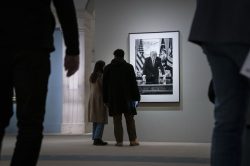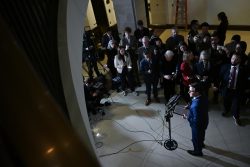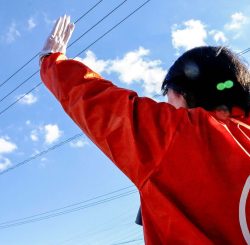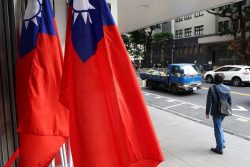
Health officials in Salt Lake City distributed information at the Utah Pride Festival in June about monkeypox. During an ongoing outbreak, the viral disease has been concentrated among men who have sex with men.
12:26 JST, June 13, 2022
Monkeypox had arrived in Salt Lake County, with two men testing positive after returning from Europe, the epicenter of a global outbreak concentrated in gay and bisexual men.
Officials in the Utah county faced a dilemma. They wanted to warn men who have sex with men that they were at higher risk for exposure to the virus. But they feared unintended consequences: heterosexuals assuming they’re not susceptible, closeted men in a heavily Mormon community avoiding care so they’re not seen as gay, and critics exploiting the infections to sow bigotry.
It’s not just Utah officials who are struggling to find the right message. As the United States confronts its largest-ever monkeypox outbreak, with nearly 50 probable cases, public health authorities navigate a delicate but familiar balancing act. In the 17 U.S. cases in which the sexual behavior of the patient is known, all but one involve men who have sex with men, mirroring trends in Europe. It’s something never recognized before in outbreaks of the virus.
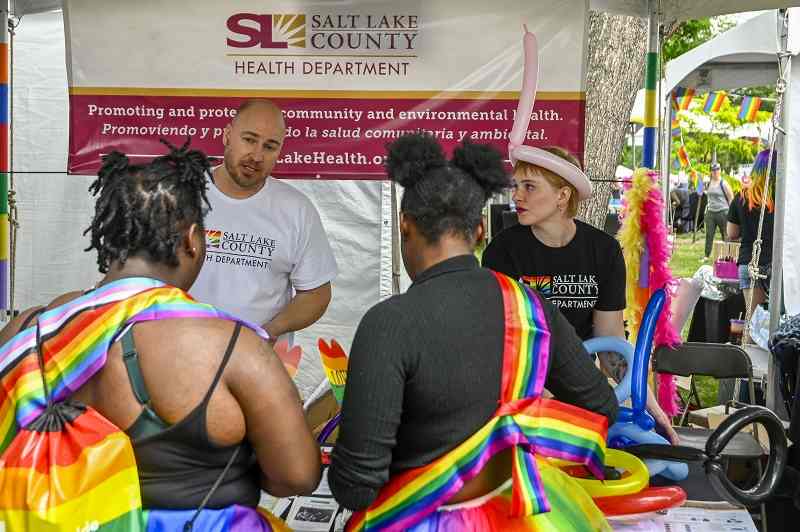
Health educators Steve Hanson, left, and Britta Watts of the Salt Lake County Health Department speak to attendees at the Utah Pride Festival on June 5.
In Salt Lake County, health officials consulted with advocacy groups and decided to get the message out to gay and bisexual men without making the message about them. At a booth during the Utah Pride Festival in Salt Lake City this month, Health Department staff distributed business-card-sized monkeypox warnings urging people to avoid close or sexual contact with anyone experiencing a rash or flu-like symptoms. The warning didn’t say anything about the gay community.
“We don’t need to put rainbows all over and make clear it’s only for [men who have sex with men] because it’s not,” said Nicholas Rupp, who oversees public outreach for the Salt Lake County Health Department. “The virus, of course, doesn’t see sexual orientation.”

Business-card-sized information about monkeypox was available at the Utah Pride Festival from the Salt Lake County Health Department.
Officials nationally want gay and bisexual men to be alert for symptoms, particularly rashes and lesions on or near the genitals, as they travel, party and congregate in June for LGBT Pride month, which commemorates the 1969 Stonewall uprising in New York that marked a seminal moment in the fight for LGBT rights. But they also want to avoid creating a false impression that monkeypox is a gay disease.
The early days of the AIDS epidemic weigh on public health and LGBT advocates responding to monkeypox. Activists say public health officials failed to act with urgency as HIV decimated gay communities in the 1980s and gay men were blamed for the epidemic.
The strain of monkeypox driving the current outbreak is rarely deadly and causes an illness lasting several weeks, unlike AIDS, which is incurable and was often lethal before effective treatments emerged in the 1990s. Even if monkeypox does not pose a mortal threat akin to HIV, health officials don’t want to ignore any emerging disease threat disproportionately affecting gay men.
“It’s really important from the public health perspective for us to make sure that populations that may be more in harm’s way because of how this started are aware of the risk, as well as how to keep themselves healthy,” said Demetre Daskalakis, who leads the Centers for Disease Control and Prevention’s division of HIV/AIDS prevention and is involved in monkeypox outreach.
LGBT organizations are mobilizing to deliver the message themselves.
Staff members from a clinic serving gay men in Chicago added monkeypox prevention to their usual public health outreach at the International Mr. Leather festival in May. The hookup app Grindr issued two alerts about monkeypox in recent weeks. An LGBT community center in South Florida scheduled a town hall meeting on monkeypox ahead of next weekend’s Stonewall Pride Parade and Street Festival after local authorities identified multiple cases.
The organizations are mindful of not creating panic. Monkeypox is easier to contain than highly contagious strains of the coronavirus circulating because it is comparatively difficult to spread. Many of the cases identified in people in the United States have been linked to travel to Europe, where most infections have been detected, although the CDC warns that the virus appears to be spreading locally, too.
Monkeypox had never been associated with men who have sex with men until the latest outbreak, when Canada, Spain, the United Kingdom and disease trackers in other nations noted infections were heavily but not exclusively concentrated in that group.
Experts said they believe it reflects the virus spreading first through gay social networks and at locations frequented by men who have sex with men, including European saunas and festivals. They also cite two factors that might be making it more likely that cases are being detected in the gay community: regular testing for sexually transmitted diseases and health providers being on alert.
“In a way, maybe we are a victim of our own success that people are coming forward and our sexual health services are picking it up,” said Andrew Lee, professor of public health at the University of Sheffield, in the United Kingdom.
The virus usually spreads through close contact with someone with rashes or lesions, which includes sex but can also include hugging, skin-to-skin contact while dancing or sharing contaminated clothing and bedding, or through droplets over a prolonged period, such as among people living in the same house. Federal officials said the virus is unlikely to spread through passing interactions in a store or bar.
Officials see a parallel to an outbreak of the infection caused by methicillin-resistant Staphylococcus aureus – known as MRSA – about a decade ago. It was first reported among men who have sex with men before being detected in locker rooms and health clubs; the bacteria spreads through shared equipment and skin-to-skin contact.
“There’s so many infections that at some point were thought to only exist in one population, and it ends up being pretty misguided,” said the CDC’s Daskalakis, highlighting the stigma cast upon Asian people early in the coronavirus pandemic.
The World Health Organization has repeatedly stressed that monkeypox is not a gay disease, and it has encouraged Pride celebrations. Advocacy groups have condemned news organizations that emphasize gay and bisexual men in their headlines and coverage.
“One of the things most strikingly wrong about the initial message about AIDS is it was gay-related immune deficiency or not transmitted heterosexually or from mother to child,” said Daniel R. Lucey, a fellow at the Infectious Diseases Society of America who started his medical career treating AIDS patients in San Francisco. “It’s clear everyone wants to call attention to avoiding the trap of blaming a certain population, in this case, men who have sex with men.”
But some cultural observers worry about an overcorrection that leaves gay and bisexual men in the dark about the viral threat.
“Early in the AIDS crisis, public health officials and news reporters didn’t raise the alarm about a new disease because they didn’t care about gay or bi men, they didn’t care whether we lived or died,” sex columnist Dan Savage recently said on his podcast. “Now, they are failing to raise the alarm because they care about us too much, so much so they don’t want to hurt our feelings or accidentally hand ammo to anti-gay bigots.”
Jim Downs, a gay historian who has written about the history of infectious diseases including HIV/AIDS, said a fixation on avoiding stigma could undermine efforts to raise awareness.
“Worry about allocating the resources to the gay community so they can get the word out,” Downs said. “We have a history where the community has been an efficacious force in the promotion of public health.”
The legacy of AIDS has created a robust network of public health organizations in the gay community, a reflection of how the community often stood alone in promoting condoms and in pressuring drug companies to develop AIDS treatments.
Bowls of condoms and STD literature are fixtures at gay clubs, and so are HIV outreach teams at gay spaces known for sexual activity. On Grindr, it’s routine for users on their profiles to list their HIV status and whether they use prevention pills to reduce transmission risk.
The International Mr. Leather – known as IML – convention in Chicago during Memorial Day weekend presented one of the first tests for organizations adapting to monkeypox.
The LGBT-oriented Howard Brown Health Center routinely sends workers to the annual event to distribute condoms and offer rapid HIV testing. In response to monkeypox, outreach workers urged people at the festival to examine themselves for lumps, bumps and redness around the genitals and to consider examining partners before having sex in the dark.
“Telling people to avoid IML? That’s ludicrous, and it will never work,” said Anu Hazra, Howard Brown’s co-medical director. “People are already at IML, so what can we do is to make them mindful.”
The White House held a call this month with advocates and nonprofits that work with gay men to discuss messaging and outreach.
“What a painful contrast it was to 1981 and HIV,” said Peter Staley, a longtime AIDS activist who was on the call. “If the White House had reached out to the gay community like this with the first reported cases in June and July of 1981, we certainly had a chance to make it an epidemic that’s the fraction of the size it ended up being in the U.S.”
Some organizations say the small number of monkeypox cases so far does not warrant a full-fledged response at the same time that HIV and the coronavirus are more prevalent.
“The interventions that work for both covid and HIV are going to go a long way for preventing the spread of monkeypox,” said Alexis Sanchez, director of advocacy and training at the Sacramento LGBT Community Center.
Five cases have been detected in Sacramento County, including close contacts of an international traveler. Those cases come against the backdrop of the CDC designating the county as having high coronavirus levels, which triggered a mask mandate in some schools.
“Especially in Sacramento with there being a surge of covid, a person is more likely to contract covid. Which isn’t to say [monkeypox] is not within our radar, but it’s not our main priority,” Sanchez said.
Some activists want HIV prevention and LGBT organizations to do more to spread warnings about monkeypox symptoms and to help quell the outbreak.
“This is a nascent crisis, and we can contain a virus that is now spreading in its early days in the United States in our community. There’s no reason to sit on the sidelines,” said Gregg Gonsalves, an epidemiologist at the Yale School of Public Health and a longtime AIDS activist.
Some have used the monkeypox outbreak to condemn Pride and other aspects of gay life.
In the United Kingdom, an organization called the LGB Alliance urged the shutdown of saunas and leather bars during Pride month to limit the spread of monkeypox, prompting an outcry from mainstream LGBT groups that have often criticized the alliance for espousing anti-transgender views.
David Bath, a 43-year-old health economist in London who contracted monkeypox in May, was among those rejecting that view, saying it would only fuel stigma and make people less likely to report symptoms.
He said his experience with monkeypox testifies to the value of a free public health system that does not ostracize gay men.
Bath sought care at a clinic where he routinely is screened for infections after he noticed symptoms that included a fever and spots on his body and after hearing about monkeypox from a doctor friend and reading an article that noted cases were concentrated among men who have sex with men.
When health authorities investigating the spread of the virus contacted him, Bath had no qualms about filling out a spreadsheet with information on 28 contacts, including friends he had hugged, his therapist and a sexual partner. Some were offered vaccines that can stop the virus from causing illness. He worries this would not be possible in an anti-gay society.
“Reticence to talk about sex and stigmatizing communities and their practices which are part of life is not just wrong and unethical, but counterproductive,” Bath said.
"News Services" POPULAR ARTICLE
-

Brigitte Bardot, 1960s Sultry sex Symbol Turned Militant Animal Rights Activist Dies at 91
-
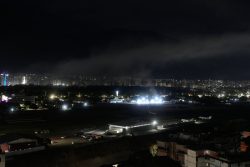
At Least 7 Explosions and Low-Flying Aircraft Are Heard in Venezuela’s Caracas
-

3 Killed in Taiwan Knife Attack, with the Suspect Later Falling to His Death from a Department Store (Update1)
-

Southeastern Taiwan Shaken by Magnitude 6.1 Earthquake, No Immediate Reports of Damage
-

Japan’s Nikkei Stock Average Slumps as AI Stocks Tumble Ahead of US Jobs Data (UPDATE 1)
JN ACCESS RANKING
-

As Chinese Tourists Shun Japan, Hotels and Stores Suffer
-

Osaka-Kansai Expo’s Economic Impact Estimated at ¥3.6 Trillion, Takes Actual Visitor Numbers into Account
-

Japan Govt Adopts Measures to Curb Mega Solar Power Plant Projects Amid Environmental Concerns
-

BOJ Gov. Ueda: Highly Likely Mechanism for Rising Wages, Prices Will Be Maintained
-

Economic Security Panels Debate Supply Chains, Rare Earths; Participants Emphasize Importance of Cooperation Among Allies


